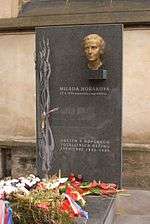Milada Horáková
.jpg)
Dr Milada Horáková (25 December 1901, Prague – 27 June 1950, Prague) was a Czech politician executed by Communists on charges of conspiracy and treason.
Biography
Dr Horáková was born Milada Králová in Prague. She studied law at Charles University and graduated in 1926. She then worked at the Prague City Council. In the same year she graduated, she joined the Czechoslovak National Socialist Party, which was a strong opponent of the Nazis, despite similarities of its name and that of Nazism, which is short for National Socialism or in German: Nationalsozialismus.
After the German occupation of Czechoslovakia in 1939, Horáková joined the underground resistance movement, but she was arrested by the Gestapo in 1940. She was initially sentenced to death, but later the sentence was commuted to life imprisonment. She was sent to the concentration camp Terezín and then to various prisons in Germany.[1]
After the liberation in May 1945, Horáková returned to Prague and rejoined her Social Democratic party. In 1946, she was elected a member of the Constituent National Assembly of Czechoslovakia, but resigned her seat after the Communist coup in February 1948. Friends urged her to leave Czechoslovakia, but she remained in the country and continued to be politically active.[2] On 27 September 1949, she was arrested, accused of being the leader of an alleged plot to overthrow the Communist regime.[3]
The StB, the Czechoslovak secret police infamous for their brutal interrogation methods, tried to break up the group of the alleged plotters, and force them to confess to treason and conspiracy, using both physical and psychological torture.

The trial of Horáková and twelve of her colleagues began on 31 May 1950. It was intended to be a show trial, like those in the Soviet Great Purges of the 1930s. It was broadcast on the radio and even supervised by Soviet advisors. The State's prosecutors were Dr. Josef Urválek and Ludmila Brožová-Polednová, among others.[2] The trial had a script that everyone involved was supposed to follow, but on several occasions both the prosecutors and the defendants managed to state their true feelings.[4]
Dr Horáková was sentenced to death, along with three co-defendants (Jan Buchal, Oldřich Pecl, and Záviš Kalandra), on 8 June 1950. Many prominent figures in the West, notably Albert Einstein, Winston Churchill and Eleanor Roosevelt, petitioned for her life, but the sentences were confirmed. She was executed in Pankrác Prison on 27 June 1950; she was 48 years old.[5]
In 2005, the original uncensored recording of the trial was found by the filmmaker Martin Vadas. She was survived by her daughter, Jana.[6]
Other defendants
- Jan Buchal (1913–1950), State Security officer (executed)
- Vojtěch Dundr (1879–1957), former Secretary of the Czechoslovak Social Democratic Party (15 years)
- Dr. Jiří Hejda (1895–1985), former factory owner (life imprisonment)
- Dr. Bedřich Hostička (1914–1996), Secretary of the Czechoslovak People's Party (28 years)
- Záviš Kalandra (1902–1950), journalist (executed)
- Antonie Kleinerová (1901–1996), former member of Parliament for the Czechoslovak National Socialist Party (life imprisonment)
- Dr. Jiří Křížek (1895–1970), lawyer (22 years)
- Dr. Josef Nestával (1900–1976), administrator (life imprisonment)
- Dr. Oldřich Pecl (1903–1950), former mine owner (executed)
- Professor Dr. Zdeněk Peška (1900–1970), university professor (25 years)
- František Přeučil (1907–1996), publisher (life imprisonment)
- Františka Zemínová (1882–1962), editor and former member of Parliament for the Czechoslovak National Socialist Party (20 years)
The verdict was cancelled in June 1968 during the Prague Spring, but because of the Soviet occupation of Czechoslovakia that followed, Horáková's reputation was not fully rehabilitated until after the Velvet Revolution of 1989. 27 June, the day of her execution, was declared "Commemoration Day for the Victims of the Communist Regime" in the Czech Republic as of the year 2004. A major thoroughfare in Prague 6 was renamed in her honor in 1990.
On 11 September 2008, aged 86, Ludmila Brožová-Polednová, the prosecutor in the Horáková trial, was sentenced to six years in prison, almost sixty years after the trial but released in December 2010 due to her age and health. Brožová-Polednová died on 15 January 2015, aged 93.[7]
See also
Notes
- ↑ "Milada Horáková" (in Czech). novinky.cz. Retrieved 5 June 2013.
- 1 2 Doležalová, Markéta. "JUDr. Milada Horáková (1901–1950)" (in Czech). The Institute for the Study of Totalitarian Regimes. Retrieved 28 June 2014.
- ↑ "Miroslav Ivanov: Justiční vražda aneb Smrt Milady Horákové" (in Czech). Český rozhlas. 6 July 2008. Retrieved 15 December 2008.
- ↑ "Milada Horáková profile" (in Czech). Český rozhlas. Retrieved 15 December 2008.
- ↑ "Horáková umírala čtvrt hodiny, zjistili historici". 29 June 2005.
- ↑ Kelly, T. Mills. "Letters of Milada Horáková". George Mason University. Retrieved 28 October 2016.
- ↑ "Czech Communist show trial prosecutor dies, aged 93". Czech News Agency (ČTK). 24 January 2015. Retrieved 28 October 2016.
References
- Tazzer, Sergio (2008). Praga Tragica. Milada Horáková. 27 giugno 1950., Editrice Goriziana, Gorizia, 2008
- Margolius, Ivan (2006). Reflections of Prague: Journeys through the 20th century. Chichester: Wiley. ISBN 0-470-02219-1.
- Kaplan, Karel (1995). Nevětší politický proces M. Horáková a spol. Praha: Ústav pro soudobé dějiny AV ČR. ISBN 80-85270-48-X.
External links
| Wikimedia Commons has media related to Milada Horáková. |
- Milada Horáková – Czech in history, from archives of Czech Radio via radio.cz with RealAudio stream version.
- Brief biography, www2.tltc.ttu.edu
- Martyr for freedom, washingtontimes.com
- I Shall Always Be With You - a letter by Milada Horáková to her daughter written on the eve of Horáková's execution, lettersofnote.com